Barry Keohane: Behind the Great China Firewall
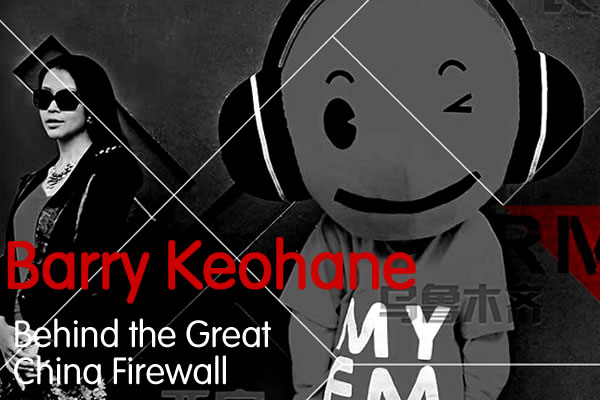
Barry Keohane has been in the industry since the late 90’s. These days, he is 1 person in a sea of 1,366,220,000 people. Right now he calls China home.
We caught with Barry in Tianjin, just a small city of 14 million people to get some insight into the potential of one of the biggest radio markets on the planet.
Let’s step back in time a little – where did you get your start and where were you before heading overseas?
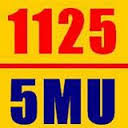 I have very vivid memories of my first radio gig, in particular my first day. I started at 5MU Murray Bridge on 1st September 1997 as Production Manager/Drive announcer . What was significant about this was that it was the day after Princess Diana died, so I spent the previous day in the Murray Bridge Hotel glued to the TV. It was also a brutal reminder about the pitfalls of voicetracking. 5MU had voicetracked their Sunday shows on Friday, so not one mention of the biggest news story of the decade.
I have very vivid memories of my first radio gig, in particular my first day. I started at 5MU Murray Bridge on 1st September 1997 as Production Manager/Drive announcer . What was significant about this was that it was the day after Princess Diana died, so I spent the previous day in the Murray Bridge Hotel glued to the TV. It was also a brutal reminder about the pitfalls of voicetracking. 5MU had voicetracked their Sunday shows on Friday, so not one mention of the biggest news story of the decade.
In that first year I got to work with a great group of “radio” people who helped shape my career. Dave Prior (General Manager) is a guy who has tremendous experience, and was tough when he needed to be. Dave Howard (PD) started at 5MU the day I did, and gave me my first real glimpse into the world of programming through his experience with MMM Adelaide. Darren Russell was the copy writer, and for a small market like Murray Bridge we came up with some great creative commercials – plus we had a lot of fun in the process. I also got to work with the very talented Kelli Underwood, who went onto to become the first female AFL commentator, plus in my last few months at the station got to work with the one and only John Vincent – a true legend of radio.
.jpg) Since then I’ve spent a great deal of time moving around between jobs and working my way up to where I am today. Before moving to China, I was Music Director/Assistant Content Director at Mix 94.5 in Perth, and again was part of a fantastic content team.
Since then I’ve spent a great deal of time moving around between jobs and working my way up to where I am today. Before moving to China, I was Music Director/Assistant Content Director at Mix 94.5 in Perth, and again was part of a fantastic content team.
China is not your first o/s posting?
 No, it’s not. After spending 4 years in Townsville (2001-2005) as Program Director for Sea FM and Mix 106.3, I was given the opportunity to work with Brian Ford and the team at ESP. Brian, Guy Dobson and Simon Mumford had been working with a group of stations in Bangkok and found it necessary to have someone on the ground working with the local teams day to day, and basically training them in the art of format radio. That’s where I came in. I spent a year in Bangkok on the frontline with the local programming teams, had some great success, and definitely prepared me for the last 2 ½ years in China. Plus learned a lot from Brian and Simon – 2 great programmers.
No, it’s not. After spending 4 years in Townsville (2001-2005) as Program Director for Sea FM and Mix 106.3, I was given the opportunity to work with Brian Ford and the team at ESP. Brian, Guy Dobson and Simon Mumford had been working with a group of stations in Bangkok and found it necessary to have someone on the ground working with the local teams day to day, and basically training them in the art of format radio. That’s where I came in. I spent a year in Bangkok on the frontline with the local programming teams, had some great success, and definitely prepared me for the last 2 ½ years in China. Plus learned a lot from Brian and Simon – 2 great programmers.
Who are you working for now and what’s your position?
 I’m working with Adrep China Advertising Services and MyFM, and employed as General Manager of Content. My role is a consulting role and providing advice to the local stations about program strategy, music and music research, talent coaching, ideas generation etc. I’m doing a lot of training, and giving the local teams the tools and knowledge to help them create great radio.
I’m working with Adrep China Advertising Services and MyFM, and employed as General Manager of Content. My role is a consulting role and providing advice to the local stations about program strategy, music and music research, talent coaching, ideas generation etc. I’m doing a lot of training, and giving the local teams the tools and knowledge to help them create great radio.
How long have you called China home now for?
I arrived in China at the start of June 2012, so I’ve been here just shy of 2 ½ years.
Where do you live?
I have an apartment in Beijing, so I suppose you could say I live there. However I do spend a lot of time travelling to our 9 stations, and usually on the road most weeks. I am actually writing this from my hotel room in Tianjin (population 14 million), about 1 hour south of Beijing. But nothing beats the feeling of coming home to my place in Beijing, unpacking, walking around in my underwear and cooking your own meals.
China’s a big place and just a few people live there… what’s been the biggest challenges for you?
The language barrier has been, and still is, the biggest challenge. One thing I learned very quickly in radio is to embrace the local culture and throw yourself into the market you are living. Whether it be Murray Bridge, Karratha, Perth or Beijing, you have to get to know your market. Any job I do, I give it 200%, so when I moved to Thailand, I learned to speak Thai and experienced as much as I could.
And in my first 12 months in China, I took language lessons to bring me to a reasonable level of Mandarin. I am not even close to being fluent, but I understand enough to be comfortable when I am travelling alone, and can have basic conversations with colleagues and friends. I do surprise myself sometimes on how much I know. My greatest moment was in a taxi at 6am in Hefei (a small Chinese city where we have a station. I say small, (it’s 7 million people!) going to the airport and having a conversation with the driver about AFL football – all in Mandarin.
Was it a culture shock?
Before coming to China I did a lot of reading about Chinese culture and doing business in China, so I knew what to expect. But still doesn’t prepare you 100% for when you arrive. I think the first weekend in Beijing was the biggest culture shock. After an overnight flight with no sleep, my driver was late to the airport, my luggage was damaged from the flight, the hotel I stayed in had a strange smell, not many people spoke English (no one at the hotel anyway) and I didn’t know anyone! But once I got out and started exploring, it got better. It’s the old fight or flight instinct – part of me wanted to get on a plane and back to my comfort zone. But thankfully my “fight” instinct won that day.
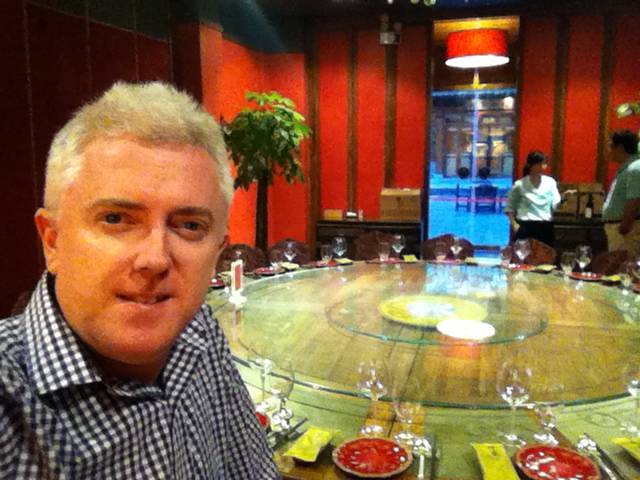
One thing you learn quickly about the Chinese is they love to eat! Plus, a lot of business and big decisions are conducted over a meal. Some parts of China (mainly in the south) that don’t waste any part of the animal, so that’s when it gets interesting. I don’t have a strangest, but let me list a few that I have tried.
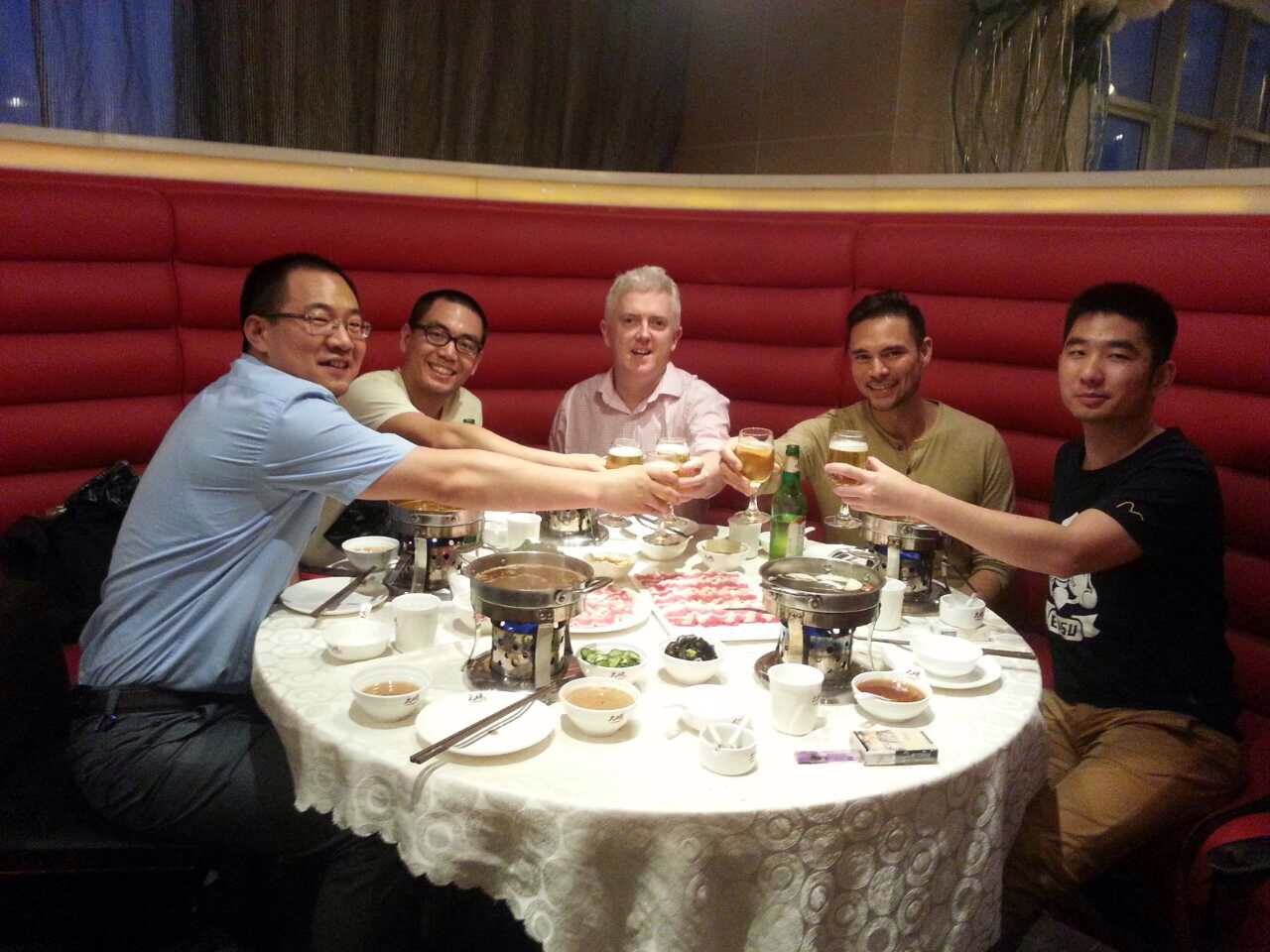
Hungry? Ah no. Goes without saying then, the weirdest experience?
In my first few months in China, I went to our station in Nanchang for a few days, and was working with our local program manager Cherry. We went out for dinner one night, and got caught in a torrential downpour. Neither of us had an umbrella, and trying to find an empty taxi was impossible so we had to share with other people. I was going a different direction to Cherry, so she threw me into a taxi with someone else and told the driver where to go. I found myself in a taxi (which had about 6 inches of water in it), driving through the streets of Nanchang with no idea where I was going and not being able to tell the driver because at that stage I knew no Mandarin. I was also barefoot because the streets were starting to flood. He dropped me off outside my hotel where they were doing roadworks. So I walked through the worksite, barefoot with my shoes in my hand, in pouring rain. All I kept thinking was “this is how Aussie tourists die”.
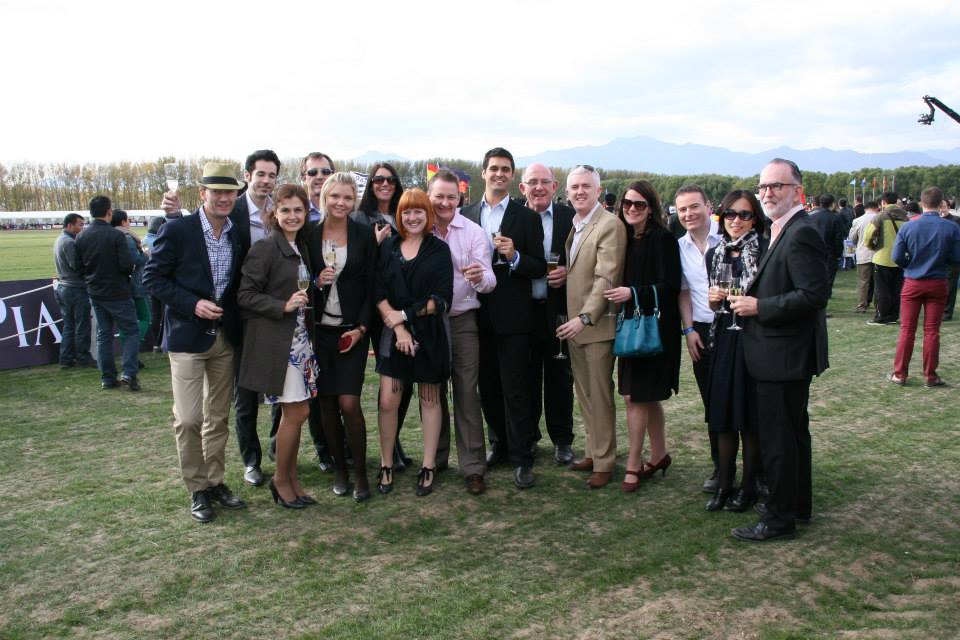 What’s the ex-pat community like… ?
What’s the ex-pat community like… ?
The expat community in Beijing is great. I have met a lot of great people since I have been here, all on a similar journey and from all over the world. They come to China for a few years, work hard, then move on. And because we are all in similar situations, it’s great to get together when I’m in Beijing and share China stories over a glass of wine or three. I’ve included a photo from the British Polo Event in Beijing last November. This photo shows the diversity of the ex-pat community. There are 11 different nationalities in this photo. All great people! I don’t think my time would have been as enjoyable if I didn’t have a great group of friends. Plus I now have places to stay when I travel to 10 other countries!
Now let’s get down to biz…
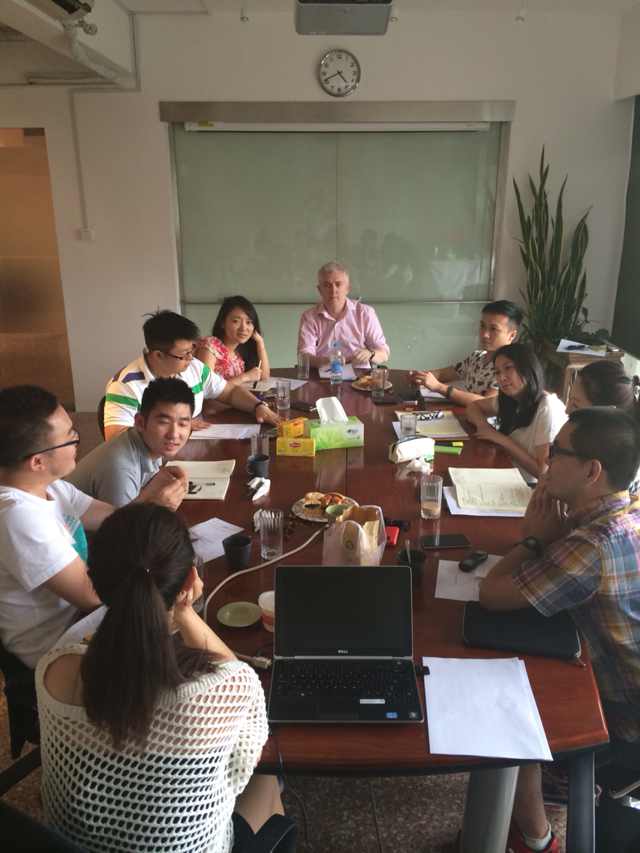
As I mentioned, the penetration of radio in China is low compared to western countries, and radio in the past has always been viewed as a propaganda outlet for the government. But this is changing, and more and more stations are starting to expand their programming and provide a variety of content. Overall I think radio is slowly becoming more popular in China, and it’s because of this that advertising on radio increased by 13% last year. More and more radio companies are looking for ways to create great content, and I think there are more and more opportunities for experienced programmers to work with Chinese radio companies and give them the tools they need to create better radio.
 Now you have the MYFM Brand.. how many markets does it span now?
Now you have the MYFM Brand.. how many markets does it span now?
Right now, MyFM is in 9 markets in various parts of China. Our markets vary in size from 5 million people (Nanchang), to over 16 million people (our newest station in Guangzhou) and are very different to each other. You have a place like Urumqi (North West of China) which is near Russia, and has a diverse population. Then you have Guangzhou where they not only speak Mandarin, but also Cantonese. So you have to adapt your content and strategy accordingly. We are also just about to launch a second network targeting an older audience, starting with a new station in Nanchang. This is another exciting step for Adrep.
Reach?
Because radio has low penetration, the reach in our markets is very low. A lot of people outside of China expect that because we are operating in markets of 5 million+ people, our cume would be in the millions. But it’s not. For example, our station in Nanchang (a market of 5 million people) cumes just over 100,000 people 10+, and we are in the top 3 stations. The positive thing is because of the growth of technology in China, most of the population have smart phones (in fact, most people have 2 smartphones), so listening on mobile devices is increasing which is helping not only MyFM, but the whole radio industry.
Is it competitive like here?
It’s becoming more and more competitive, especially from a revenue point of view. Radex is increasing, so the battle for each RMB is getting tougher. From a programming point of view, Adrep is leading the way in creating an international, world class radio brand and other stations are starting to take notice. This has allowed us to attract a range of local and national clients because they like what they hear. In some of our markets, we have noticed that other stations are starting to copy our format – almost song for song. That is flattering, but at the end of the day they don’t have the experience or the level of execution that our teams have developed. But there is definite interest from other stations to explore a different, “western” style of radio.
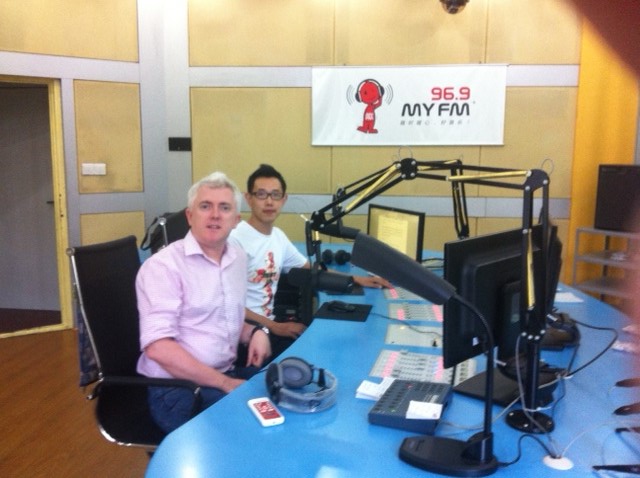
We have a certain level of autonomy, but there are some things that we won’t do on-air, either for cultural reasons or for content reasons. For example, our stations don’t broadcast news or traffic, and focus purely on music and entertainment/lifestyle based content. There are designated stations in each market that are based around news and traffic. In fact, in most of our markets the number one stations are traffic stations. A real success story is the traffic station in Changchun (north east China). Their share is around 50%! This is because the traffic levels are so high, and more and more people are traveling to and from work in cars, they listen for traffic information. We also don’t touch anything political (for obvious reasons), and we try and avoid any content around sex or sexual relationships (eg. Breakfast talk topics). Mainly because our audience leans towards the conservative side, but also because the DJ’s are really not comfortable talking about it too.
One thing I think you can count on is the Chinese are great at replicating a product… have other stations copied what MY FM has been doing?
Yes ,there are some stations that have started to copy our format. We have a music position in our markets of “My FM’s Music 40”. 40 minutes of commercial free music. Some of our competitors have been bold enough to copy the exact message, which is a bit worrying as it confuses the market a little. But as I mentioned above, it’s easy to copy a format but if you don’t have the skills and knowledge to execute it, and develop more content, then it’s just a drop in the ocean. I’m confident our product is better and it continues to evolve and improve.
Are markets surveyed?
8 of our 9 markets are surveyed weekly, with Xi’an surveyed 4 times a year. It was difficult to get my head around weekly surveys, plus the sample size for such big markets is incredibly small. However, we use it more of a guide and I put more trust in what I hear come out of the speakers than in the survey results. We are also doing digital music research and perceptual studies (focus groups). They always give us a better read on the market, and how we are doing.
How do you deal with language barriers… or have you become fluent in Mandarin?
I’ll be honest, it is tough, but I have a great group of people who act as translators so I know the message is getting across. I do have a basic understanding of Mandarin, so can pick up some things during a talk break and when monitoring the stations. Plus when staff are talking I can normally pick up on what they are talking about based on a few words. But when it comes to the detail of the break, or when I am teaching new skills, I always need a translator to help get the message across. It stretches things out a bit, but it’s important that the message gets across. Milly, who is basically my assistant when I travel, does a great job at getting the message across. I am still trying to convince her to become a program manager because she knows everything I’ve communicated since I have been here, as she has had to translate most of it. Plus translating for Keith Fowler before me – so she is a goldmine of information.
One of the best “lost in translation” stories happened in my first few months. I went to dinner with the staff in Changchun and we were drinking the local spirit (Baijiu). At the end of the meal I said to the branch manager David, let’s have one drink for the road – a very common expression in Australia. When he translated it to the staff, it was translated as “let’s have one drink before we die”. The staff looked at me in total shock, until we explained the confusion.
Before wrap it up… got an Ancient Chinese Proverb for us?
I don’t know why this is my favourite, but it sticks in my mind and it’s the first I think of when people ask me this question. “You have to kill a chicken to scare the monkeys”. I think its origin is military, and means you have to make an example of someone to keep everyone else in line. Not something I do, and quite frankly I just though it interesting because I never associated chickens with monkeys.
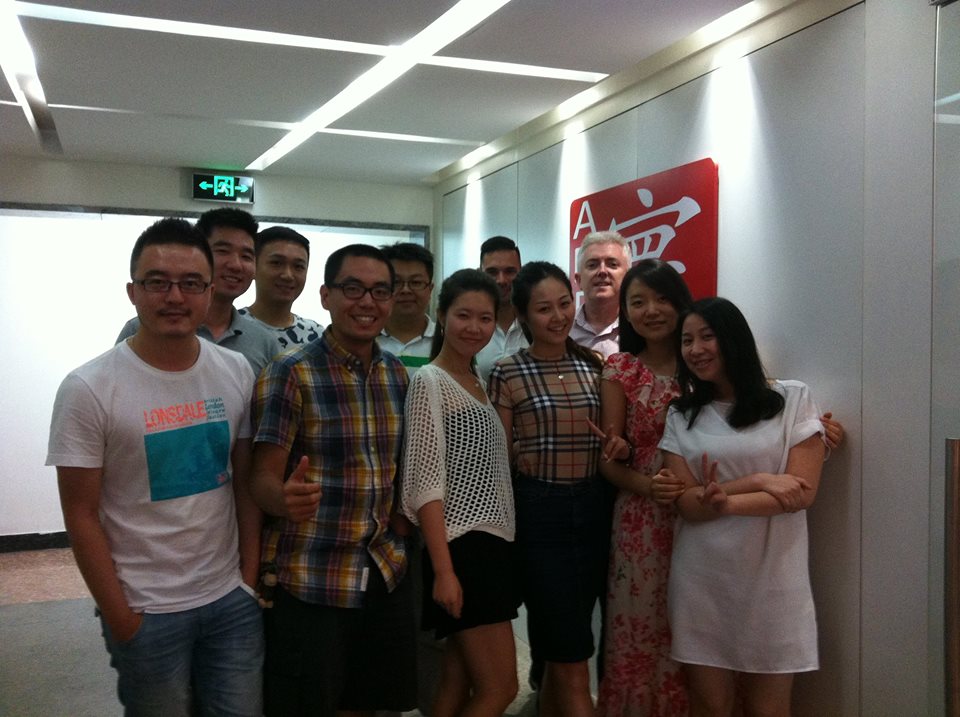 What’s next?
What’s next?
Yes, I have resigned from Adrep and will be finishing at the end of the year. I haven’t committed to my next role, but there are a few things I am looking at. I do like the idea of settling back in Australia and taking on a content role in one of the capital cities, but I also like the idea of doing some more consulting and may look at other opportunities in China and other parts of Asia.
The experience I have gained in China has made me not just a better programmer, but a better manager and I look forward to whatever comes along. I will miss China and the friends and colleagues I have here. It has been another life changing experience.


